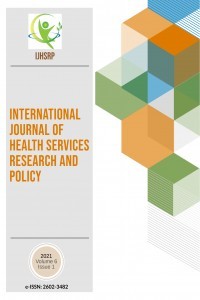OPINIONS OF HEALTH WORKERS ABOUT WORK PLACE: AN EXAMPLE OF BISMIL PUBLIC HOSPITAL
OPINIONS OF HEALTH WORKERS ABOUT WORK PLACE: AN EXAMPLE OF BISMIL PUBLIC HOSPITAL
This study aimed to investigate opinions of health workers about workplace on behalf of workers’ rights, occupational safety and relations withadministration in a public hospital. Data were gained from 93 healthworkers working in a district of Diyarbakır , Bismil Public Hospital. Asurvey was conducted among health staff face to face and obtained datawere analyzed by SPSS 15.0 package program. Findings showed that 34,4%of participants were between age of 26-30, 49,5% were female and 83,9%were married. While 53,8% of health staff expressed that they were able toreport their problems to hospital management, 6,5% of them stated thatdirectory of hospital didn’t mind problems of workers. 44,1% of health staffstated that hospital management didn’t take enough measures in order toprovide safety at work. It was also found that 78,5% of participants weresatisfied with trainings for vision and quality of hospital but 33,6% wereunsatisfied with trainings for reporting workplace violence in the hospital.74,2% expressed that employees were not awarded frequently in thehospital. It was found that there was a negative relationship between ageand satisfaction about management relations in the hospital (-,245,p<0,05). This may result from higher expectations of older workers. Alsohealth workers having more work experience were not satisfied withmanagement relations (,269, p<0,01).Health workers who thought they were working in a safe workplace weremore satisfied with management relations (,342, p<0,01). When relationshipbetween work experience and satisfaction with definition of task wasanalyzed, a negative correlation was found (-,229, p<0,01). A positivecorrelation was found between effective use of human resources and precisetask definition ( ,288, p<0,01). As a result it can be said that priority shouldbe given to improve relationships between management and staffs.Employees should feel themselves as a part of the organization.
Keywords:
Health services, health workers hospital,
___
- [1] Gözüm S. Koruyucu Sağlık Hizmetlerinde görev yapan hemşire ve ebelerde iş doyumunu etkileyen örgütsel faktörlerin ve iş doyumu, tükenmişlik ve işe devamsızlık arasındaki ilişkinin araştırılması. Hemşire, 47 (1997). pp:37-45
- [2] Görgülü S. Hemşirelik ve Anksiyete. Türk Hemşireleri Dergisi, 38 (1998), pp:23-28
- [3] Werner A. Motivation in human resources management, Oxford University Press, Cape Town: South Africa, 2001, p. 587.
- [4] Aslan, Ş., Özata, M. & Atayeter C. Sağlık İşletmelerinde Ekip Yönetimi: Fırsatlar ve Sınırlılıklar. Standart Ekonomik ve Teknik Dergi, 43 (2004), pp 17-23.
- [5] Özer A. & Çakıl E. Sağlık Hizmetlerinde Hasta Memnuniyetini Etkileyen Faktörler. Tıp Araştırmaları Dergisi, 5 (2007), pp.140-143.
- [6] Aydın R. & Kutlu Y. Hemşirelerde İş Doyumu ve Kişilerarası Çatışma Eğilimi İle Olan İlişkisini Belirleme, Cumhuriyet Üniversitesi Hemşirelik Yüksekokulu Dergisi, 5 (2001), 37-45.
- [7] Ünalan D., Çetinkaya F., Özyurt Ö. & Kayabaşı A. Bir Üniversite Hastanesinde Çalışan Sekreterlerde İş Memnuniyeti, Hacettepe Sağlık İdaresi Dergisi, 9 (2006), pp. 1-18.
- [8] Kanber N.A., Gürlek Ö., Çiçek H., Gözlükaya A., Bir Sağlık Kurumunda Sağlık Çalışanlarının Memnuniyeti, Sağlıkta Performans ve Kalite Dergisi, 2, (2010), pp. 114-126.
- [9] Kavuncubaşı Ş. Hastane ve Sağlık Kurumları Yönetimi, Siyasal Kitapevi, Ankara, Turkey, 2000.
- [10] Alcan Z. Bayındır Tıp Merkezi Hemşirelik Hizmetleri Müdürlüğü Hasta Memnuniyet Anket Sonuçları, Sağlık Hizmetlerinde Toplam Kalite Yönetimi ve Performans Ölçümü, Haberal Eğitim Vakfı, Ankara, Turkey, 1997.
- [11] Devebakan N. & Yağcı K., Sağlık İşletmelerinin Algılanan Hizmet Kalitesi Düzeylerinin Karşılaştırılmasında SERVQUAL Yönetimi, Sağlık ve Hastane Yönetimi 2. Ulusal Kongresi Bildiri Kitabı, Ankara, Turkey, 2005.
- [12] Sevimli F. & İşcan Ö. F., Bireysel ve İş Ortamına Ait Etkenler Açısından İş Doyumu. Ege Akademik Bakış, 5 (2005), pp. 55-64.
- [13] Arcak R. & Kasımoğlu E., Diyarbakır Merkezdeki Hastane ve Sağlık Ocaklarında Çalışan Hemşirelerin Sağlık Hizmetlerindeki Rolü ve İş Memnuniyetleri. Dicle Tıp Dergisi, 33 (2006), pp. 23-30
- [14] Doğan S., Güler H., Koçak E., Hemşirelerin Hastaların Öfke Davranışlarına Tepkileri ve Kendi Öfke Düzeylerinin Belirlenmesi, Cumhuriyet Üniversitesi Hemşirelik Yüksekokulu Dergisi, 3 (1999), pp.20-25.
- [15] Erdem R., Rahman S., Avcı L., Göktaş B., Şenoğlu B. & Fırat G., Investigating Job Satisfaction and Burnout Levels of the Persons Working for the Hospitals at City Center of Elaziğ, Turkey, Journal of Applied Science Research, 4 (2008), pp. 188-201.
- [16] Gyekye S.A., Workers’ Perception Of Workplace Safety And Job Statisfaction, Int J Occup Saf Ergon 11 (2005), pp.291-302.
- [17] Kıdak L. & Aksaraylı M., Sağlık Hizmetlerinde Motivasyon Faktörleri. Celal Bayar Üniversitesi Sosyal Bilimler Enstitüsi Dergisi, 7 (2009), pp. 75-94.
- Yayın Aralığı: Yılda 3 Sayı
- Başlangıç: 2016
- Yayıncı: Rojan GÜMÜŞ
